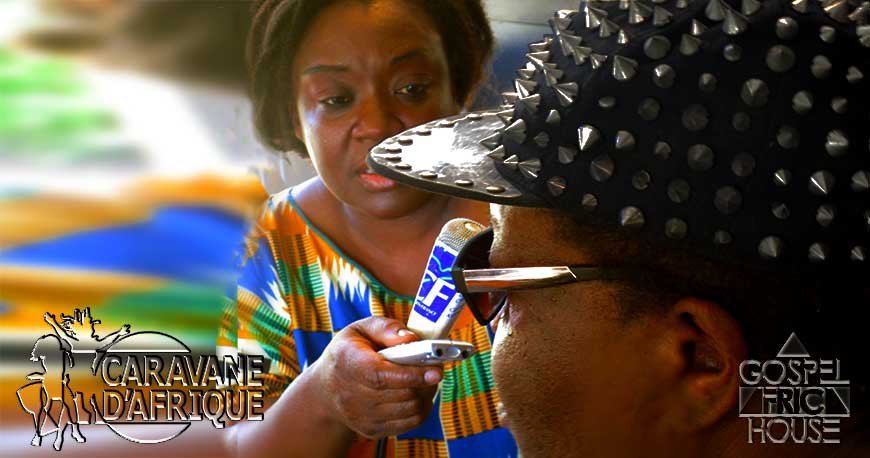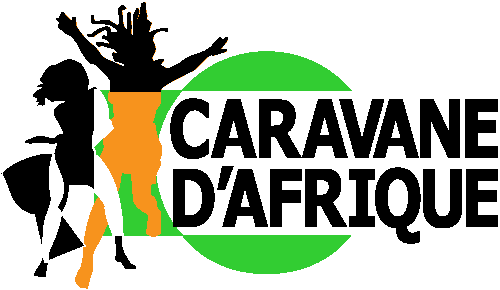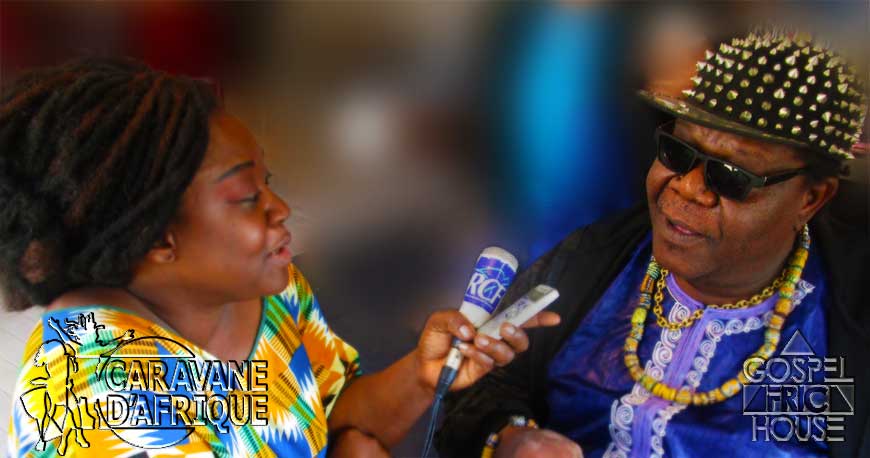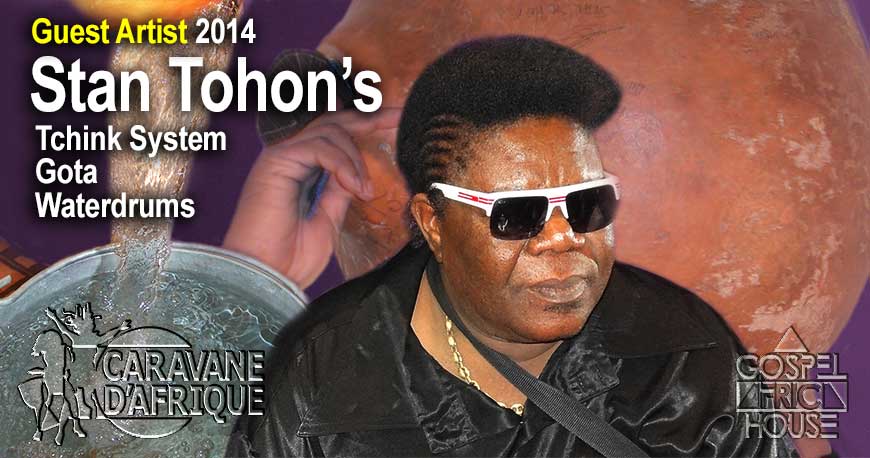Hello Stan Tohon!
Hello!
We are the day after the Caravane d’Afrique concert. Thank you for having agreed to come back to this stage for two consecutive years. What are your impressions?
I was, once again, surprised by the support of the audience in Pougues-les-Eaux, Nevers and around, for Caravane d’Afrique, and because the concert was warmly attended from start to finish yesterday. We have noticed that the public was there. They actively participated and I thank them for this. Unfortunately some unpredictable health issues didn't allow Manu Dibango to join us on stage yesterday as planned in the first place. This just gave a little shade of ...
A little shade of Blues?
Let’s say just a little flat that we corrected anyway, because all of the artists were still positively determined and gave themselves a decisive boost, and each brought talent beyond limits to satisfy that audience which always gave us credence. So I think next year’s edition will be even more successful and I wish good luck to Caravane d'Afrique.
So you as one of the big names of African music, what is your view, what is the look you put, in general, onto African music in its progression?
It must first be mentioned that the generation, today, usually called the conscious generation, was lucky enough to have all new information technologies, and now when people book for recording albums, they don't work in studios the old way we did any more.
Because, in our good old days, the time we belonged to, if you are not really a musician, you could not just walk into a studio and get out of it with clean songs. You had to know everything about the tempo rules; also must know about harmonies; must also know a lot of technical or artistic guidelines and so on before confidently landing into a recording studio.
IBut nowadays, as I said, thanks to the new technologies, almost anyone can go into a studio and get just anything. As a matter of facts, in this process, there are some good things and as far as African music is concerned, young talents are revealed such as Richard Bona, as well as quite a few others, but it must also be said that there are a lot of waste.
II think many young people will question and avoid the easy solutions, because today everyone wants the lazy ways of getting at the top and no longer wants to work hard. So some young people still work more to bring more to African music. So, to more precisely answer to your question on African music in general, we can say it is chugging or struggling along. Because there are no major record companies any more in Africa. Most of the big publishers have collapsed. So artists have no other choice left other than to self-produce and self-distribute their albums. This is not quite easy because it requires a professional knowledge of the distribution networks.
So Stan Tohon, if there was a legacy to think about, artistically speaking, to culturally leave all these young people, or if there was a legacy, I also would like to mention Caravane d’Afrique, since it embraces across the whole Africa and African culture. Would you be willing to leave a legacy and what legacy would it be?
First of all, I must say that if I already agreed to support Caravane d’Afrique the reason for this is what Caravane d’Afrique stands for, as a vehicle, and what content it conveys. It should be praised to see a woman, even more, a singer who commits herself in taking care of other singers, her sisters and brothers, of African music in general, fighting against winds and tides, in her struggle to initiate a festival in and around a city which is her adoptive city, where she seeks to give some joy and happiness to those audiences, and invited artists as well as far beyond, to each and everyone.
As far as I am concerned, I think, Caravane d’Afrique has already given me the opportunity to come and sign-in, to give my signature in this ongoing history, because what is happening is history. It will be told throughout ages. So when I think about the Tchink System water drums, Caravane d’Afrique has already allowed the inhabitants of these cities around Nevers, Pougues-les-Eaux, to come and discover these water drums, because yesterday, after the show ...
It was amazing!
… An African, a black guy told me that thanks to Amtha Kol, he has discovered those water drums for the first time, although he was African. I asked him "what nationality are you?"And he is Togolese, but he didn’t know about the water drums. He gratefully added that it is thanks to Caravane d’Afrique, and thanks to this city of Pougues-les-Eaux that he discovered the water drums. So I can say that we are writing down a signature that will be indelible or permanent.
Again, thank you. Thank you for your much appreciated contribution, Stan Tohon’s participation, for having displayed and demonstrated your Tchink System water drums in this programme and in the the Caravane d’Afrique guestbook. I have also strongly desired Manu Dibango’s contribution. We have arranged a contract for everything to run smoothly, but man proposes, God disposes. Manu Dibango who is at hospital right now at the time we are recording this interview.
I'll manage to find out more and call him when I'm in Paris...
Do not hesitate to give us some news and we keep fingers crossed and then, voila!
Do not worry. I think nothing serious is likely to happen!
Hopefully we will have the pleasure of welcoming him again, perhaps in future edition. I was glad to meet Angelique Kidjo recently, who was also in the area, as she was scheduled at the nearby Printemps de Bourges festival, and Angélique granted me a really beautiful interview. So I am thrilled by people like Stan Tohon, Angelique Kidjo, Manu Dibango, I mean all these great names of African music who, in a way or another, do support this Caravane d’Afrique event. Thanks to you all. RCF radio is also struggling along to allocate me a time slot to carry on playing this music. So the continued promotion. So the promotion continues.
Thanks to RCF radio. Thanks to Caravane d’Afrique and thank you to all the administrative bodies located in Pougues-les-Eaux, Nevers or beyond, that do support you. It is normal to tell them all thank you because such initiatives like yours, ardently deserve support, for African music to go forwards. Long live African music, for music to live throughout the world.
Thank you Stan Tohon, and see you soon!
Thank you, Amtha!
Interview transcripted from French and translated into English by Clement R. Lawson




